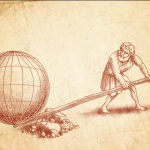Look! It’s Friday! So that must mean something. I have a few thoughts about some things.
One
I’m halfway through this long brilliant thing about habits and machines and people. It’s really good–at least so far. It starts out this way:
Of all the attempts to pinpoint the origin of modernity—an exercise of which modernity never tires—my favorite begins with medieval monks. According to this account, it was the Benedictines who came up with the idea that it was possible to do the same thing, at the same time, every day. Although time was still widely regarded as fluid and coterminous with eternity, the monastery was governed by the rhythms of that most modern instrument: the clock. The monks rose together, ate together, and prayed together, starting and stopping each task at the appointed canonical hour. In time, their obsession with order seeped into the world at large. The tradesmen and merchants in town heard the monastery bells ring out eight times a day and began to synchronize their daily tasks to their rhythm. The butcher picked up his cleaver at Prime and set it down for lunch at None. Clerks hustled to finish their work by Vespers. Time became currency, something that could be spent or saved, and people increasingly turned to machines to make life more efficient. By the dawn of the Industrial Revolution, the religious impulse behind these regimens had been long forgotten. The monastery gave way to the factory. Ritual dissolved into routine.
Truly, I think this is the article I’ve been waiting to read for ages. I hope it solves all my problems. Plus, the writing is practically divine.
Two
Then, on the other hand, there is this very different style of writing and attitude about everything. It begins this way:
Excuse me, reader, but would you have a moment to talk about the obnoxious practice of asking people to talk about “our” lord and savior? In a previous piece for RD, one of the reasons I gave for why America’s conversation about Christianity is “fundamentally unserious” is that our elite public sphere systemically silences “the voices of leavers, nonbelievers, and religious minorities in discussing Christianity and ‘religious freedom.’” As a case in point, I brought up Christianity Today columnist Bonnie Kristian arguing in The Week that any objection to the Christian practice of proselytizing must be based in either partisanship or ignorance of Christianity. As her assertion of this clearly false dichotomy demonstrates, if we’re to take her at her word, Kristian is unable to conceive of literally any serious reasons someone might find proselytizing unethical or distasteful, since, after all, it’s an aspect of Christianity that is “extremely old and (within the church) uncontroversial.”
As a rule, I do enjoy a cutting style and was prepared to see what interesting things were going to be said about this important topic. Eventually, though, landing on this bit, I gave up:
Frankly, all it should take is a little basic empathy and an understanding that, pluralism being a given of modern societies, a democratic and equitable approach demands that we treat those who are different from us with respect, even if we have the formal right not to. To clarify that last point, I am not advocating that we ban conversion efforts; that would be an illiberal assault on free speech. But I am advocating that we work to change the hearts and minds of our fellow citizens until proselytizing becomes a serious faux pas.
Actually, it was before that, when she included an infographic she’s made to help people understand how they should be:
Oh, and then there’s this bit:
In addition to what I said above, let me note that religions are what their adherents make of them. Their teachings are always subject to communally mediated interpretation, and they are reformable. Some Christians interpret the so-called “Great Commission” (Matthew 28:19-20) as a call to humanitarian action rather than efforts to convert people specifically to Christianity. Others take the fairly benign approach of simply trying to live out their faith as an example of a righteous, upstanding life, and won’t bother anyone about their beliefs unless they’re asked. No matter what anyone tells you, Christians don’t have to hand out tracts, badger, or behave manipulatively toward those in their lives who don’t share their beliefs. So let’s stop coddling those who insist that they do. To be clear, the manipulation I’m referencing isn’t only an aspect of particularly rude, clumsy approaches to proselytizing, which always entails making people into projects. “Polite” proselytizing and so-called “friendship evangelism” are as supremacist and objectifying as more directly aggressive conversion efforts.
Mmmm, yes, some people do try to recast the Great Commission as a call to humanitarian action but when they do that they are no longer having anything to do with said “Great Commission,” which is literally about Jesus building his own kingdom on earth and using his own disciples to do it, a kingdom that is, unhappily, “not of this world” etc. etc.
Later she coins the term (I mean, I haven’t heard it before, so I’ll give her the credit) “Christian Supremacy,” so that’s super funny and a day late and a century short. Like so many online moments these days, I don’t know where to start. I mean, the first thing one could say is that the whole point of religion is not “what their adherents make of them.” This strikes me as being one of those occasions that Carl Trueman so helpfully delineates, where a Third World Person encounters a First or Second World Person and doesn’t even know what to do. Some people believe in objective, verifiable verities that are not subject to whatever their adherents decide to make of them. Christians, like other kinds of religious people, are not able to decide what they can and cannot do. They are constrained not by infographics, but by the terribly uncomfortable commandments of their Lord who compels them into the highways and byways of the world He has made to gather up his lost sheep.
I mean, I do also love the “there are no shortcuts to being a good person least of all ‘right belief'” bit on the chart. It is utterly tragic that this person would consider herself a “leaver” of Christianity, for, in truth, she has not left Christianity. Christianity is not about getting into heaven because you are good, or being a good person because you have the correct beliefs. That would be what she, unwittingly, reveals about her own system of belief. She thinks she can be a good person by warning off awful people who want to be her friend, even in the name of Jesus. Christians–if they are really Christian, which is sometimes hard to tell, though not really as hard as you would think these days–worship a God who comes in human flesh to take on their sins and rescue them from hell. They know they are not good people. They are very bad people. When they try to do good, they can’t do it, even though they know they should. They trust a person–Jesus–to pull them out of the pit of their own making and bring them into eternal life. This is such terribly good news that they naturally long to tell all the other bad people about it, so that they too can live both now and forever.
Three
There were so many nice lines in the Psalms for this morning. The first two verses of Psalm 32 for instance:
Blessed is the one whose unrighteousness is forgiven,*
and whose sin is covered.
Blessed is the one to whom the Lord imputes no sin,*
and in whose spirit there is no guile.
And then verses 6, 7 and 8:
I said, “I will confess my sins unto the Lord”;*
and so you forgave the wickedness of my sin.
For this reason shall all the godly make their prayers unto you at a time when you may be found;*
when the great floodwaters rise, they shall not reach them.
You are my hiding-place; you shall preserve me from trouble;*
you shall encompass me with songs of deliverance.
Gosh, that has got to be your prayer when you’re going out into an angry and lost world with such wonderful news–that God does not leave us to our own devices, nor even download various infographics to help us get it right, but comes himself to love us and be with us forever.
Four
I’ve been binging on”free” (they’re included with my membership) Agatha Raisin novels on audible without knowing why I can’t stop. I mean, they are by no means brilliant literature, BUT, they are read mostly by Penelope Keith and they are about a middle-aged obsessive woman who feels super insecure and loves to eat fried things but then feels terrible about how fat she is. Why do I love these so much, I kept asking, but I guess that’s a stupid question. I also love to eat fried things but then feel terrible about how those fried things aren’t making me any thinner. I guess maybe it’s time to move on to some other kind of very light murder mysteries.
Five
One way you can know everyone is bad is this:
Winter 2022 Men’s Fashion: Crocheted Pants & Jumpers
And that, my friends, is it for today. I’m off to do something very important, probably.














